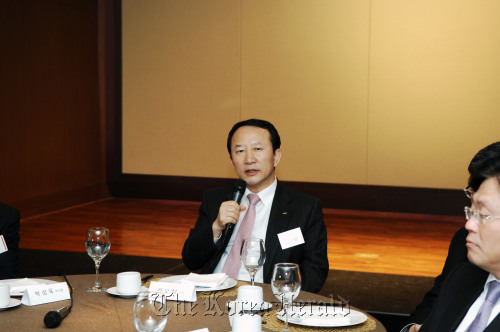Hynix Semiconductor Inc., the world’s second-biggest computer memory chipmaker, said it would focus more on producing premium products in the non-PC sector this year in a bid to widen the gap with other follow-up firms on the global stage.
Kwon Oh-chul, chief executive of Hynix, said in a press conference late Thursday that the premium product line-up will account for about 70 percent of sales in 2011, up from 50 percent a year earlier.
“We will work towards maximizing operating efficiency and price competitiveness to offer comparatively more in every sector when considering the investment made,” he told reporters. “Although our sales and operating profit are likely to be impacted by the market and currency situations, I wish to make this year one we can develop further.”
Kwon Oh-chul, chief executive of Hynix, said in a press conference late Thursday that the premium product line-up will account for about 70 percent of sales in 2011, up from 50 percent a year earlier.
“We will work towards maximizing operating efficiency and price competitiveness to offer comparatively more in every sector when considering the investment made,” he told reporters. “Although our sales and operating profit are likely to be impacted by the market and currency situations, I wish to make this year one we can develop further.”

The press conference, which was the first of its kind, was held on the day Hynix unveiled its consolidated sales for 2010 reached a record 12.09 trillion won ($10.86 billion), up by 53 percent from 2009, amid the price fall of two major memory chips ― dynamic random access memory (DRAM) and NAND Flash memory.
The company also posted its operating profit at 3.27 trillion won, an increase of 1,605 percent from 192 billion won recorded in 2009.
When asked whether there was a list of companies looking into acquiring the global chipmaker, Kwon said there was not yet a candidate expressing strong interest in the merger.
“It’s a pity that there isn’t a company making such a point as of now,” he said. “Disregarding the change in ownership, we’ll concentrate on better running the business to make additional positive transformations.”
Kwon also played down some analysts’ expectation that Hynix is likely to go into the red in the first quarter of this year, while admitting it largely depends on the price dips of memory chips, as the chip market is a volatile one.
“We can’t predict how the prices will change in the market and one company can’t take control of the prices,” said Kwon. “But even if the prices are bad, we have many premium line-ups which we hope will add to stabilizing the company. My hope is for us to level-up our competitiveness to make profit in whatever situation we’re in.”
By Cho Ji-hyun (sharon@heraldcorp.com)







![[Graphic News] More Koreans say they plan long-distance trips this year](http://res.heraldm.com/phpwas/restmb_idxmake.php?idx=644&simg=/content/image/2024/04/17/20240417050828_0.gif&u=)
![[KH Explains] Hyundai's full hybrid edge to pay off amid slow transition to pure EVs](http://res.heraldm.com/phpwas/restmb_idxmake.php?idx=644&simg=/content/image/2024/04/18/20240418050645_0.jpg&u=20240419100350)





![[From the Scene] Monks, Buddhists hail return of remains of Buddhas](http://res.heraldm.com/phpwas/restmb_idxmake.php?idx=652&simg=/content/image/2024/04/19/20240419050617_0.jpg&u=20240419175937)

![[KH Explains] Hyundai's full hybrid edge to pay off amid slow transition to pure EVs](http://res.heraldm.com/phpwas/restmb_idxmake.php?idx=652&simg=/content/image/2024/04/18/20240418050645_0.jpg&u=20240419100350)

![[Today’s K-pop] Illit drops debut single remix](http://res.heraldm.com/phpwas/restmb_idxmake.php?idx=642&simg=/content/image/2024/04/19/20240419050612_0.jpg&u=)